Unit3 Could you please tell me wherethe retrooms are Section B (1a~Self Check)课件(共50张PPT)
文档属性
| 名称 | Unit3 Could you please tell me wherethe retrooms are Section B (1a~Self Check)课件(共50张PPT) | 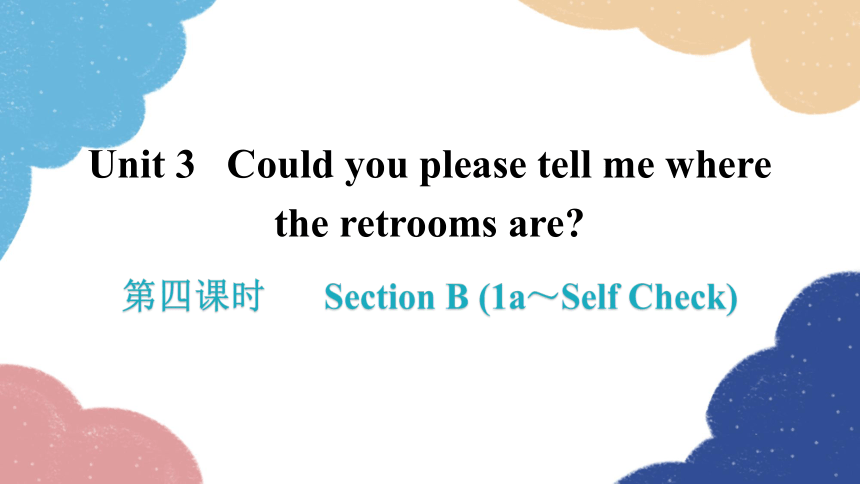 | |
| 格式 | pptx | ||
| 文件大小 | 494.8KB | ||
| 资源类型 | 教案 | ||
| 版本资源 | 人教新目标(Go for it)版 | ||
| 科目 | 英语 | ||
| 更新时间 | 2022-10-01 21:31:33 | ||
图片预览

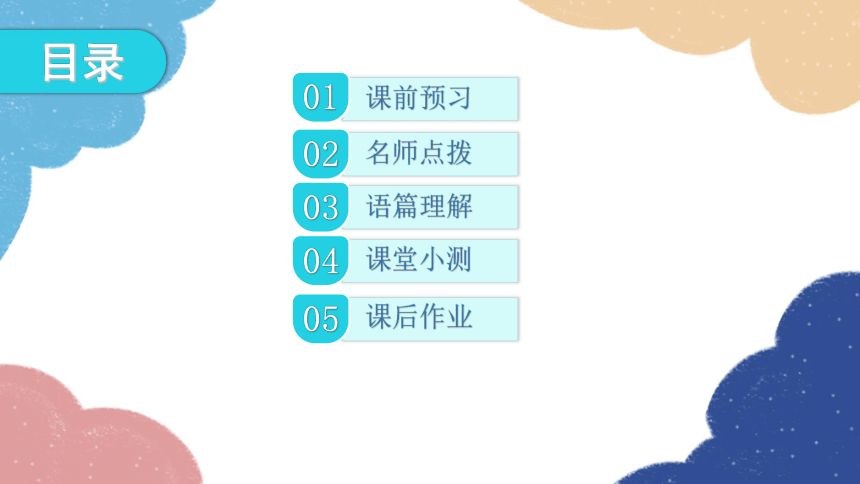
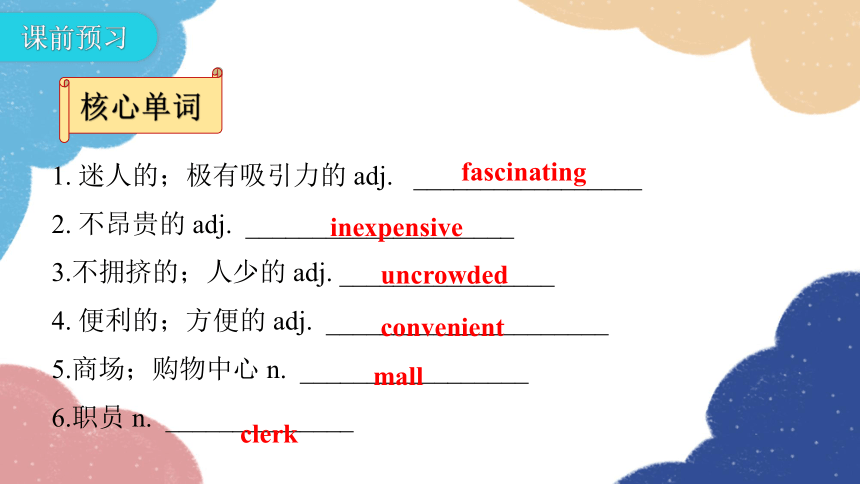
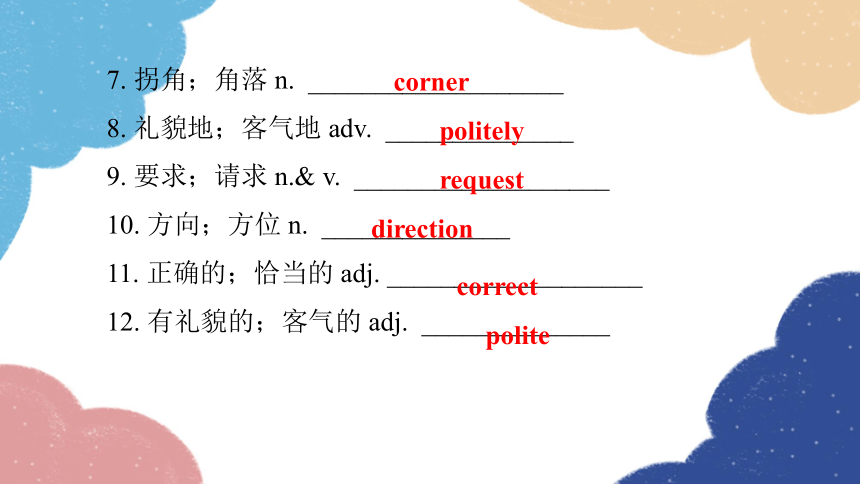
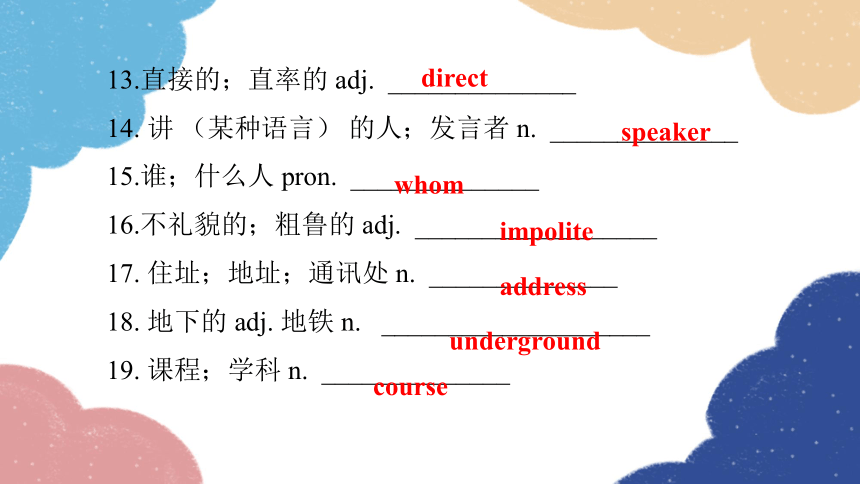
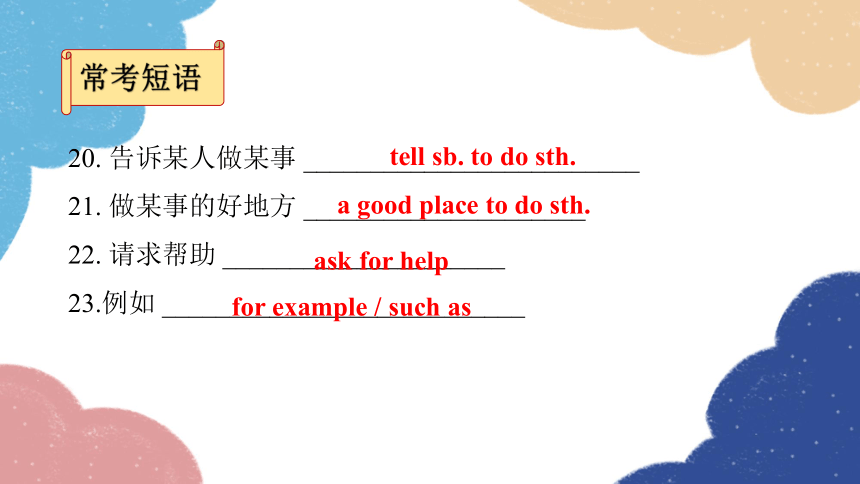
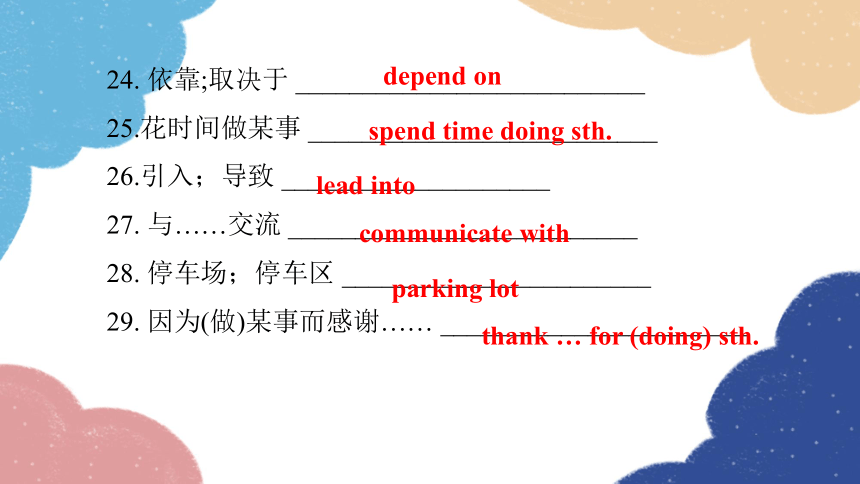
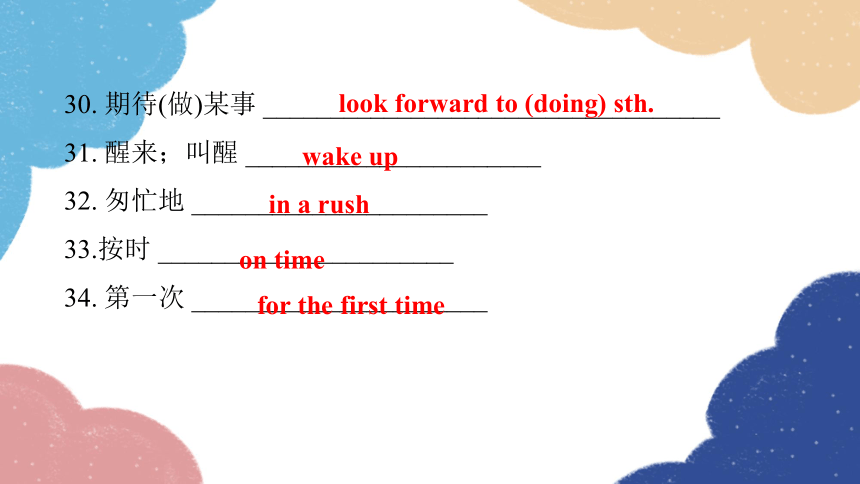
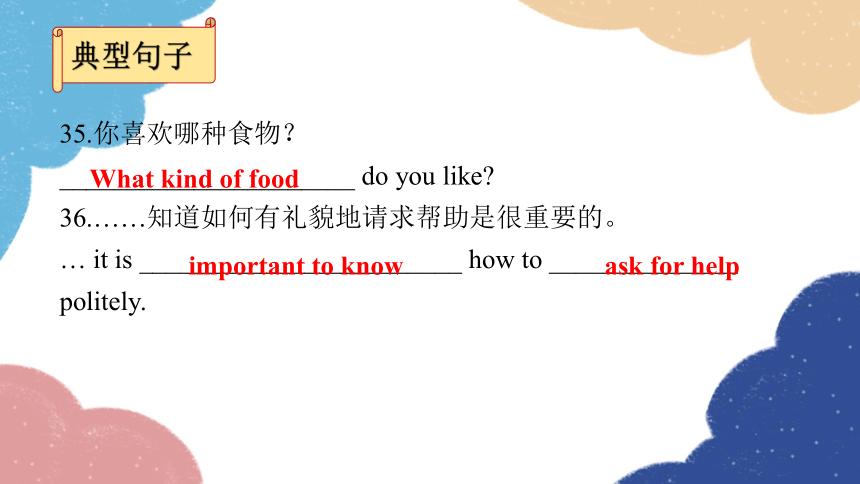
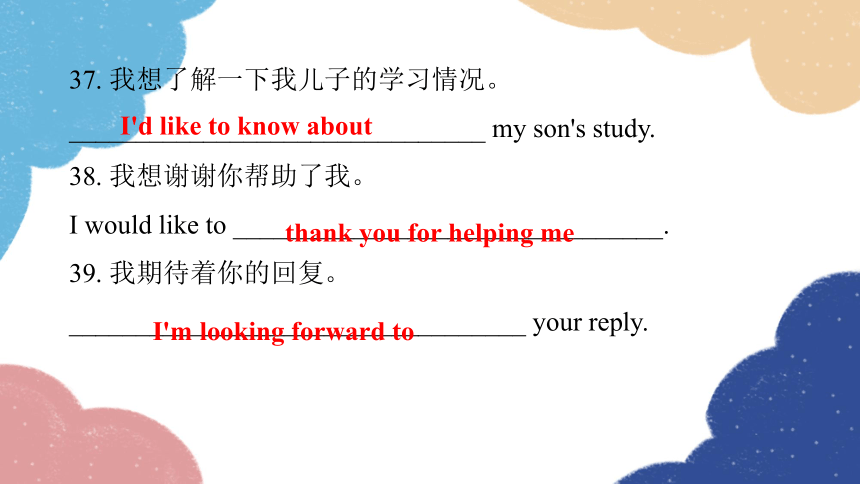
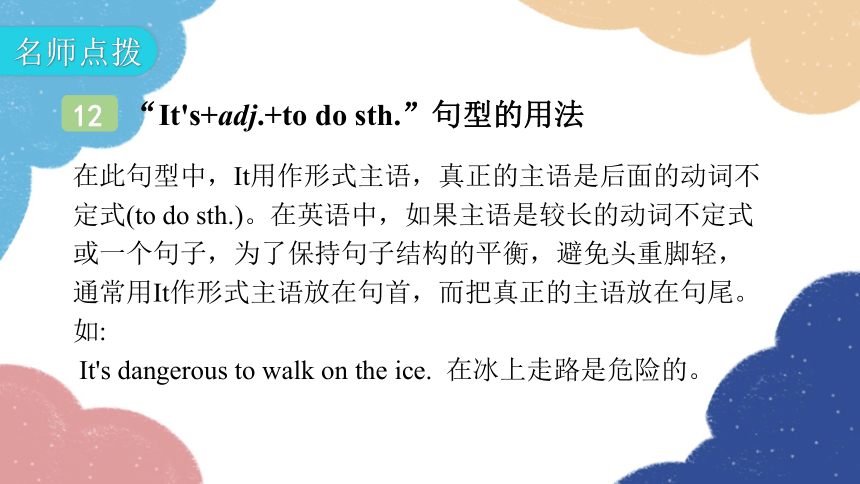
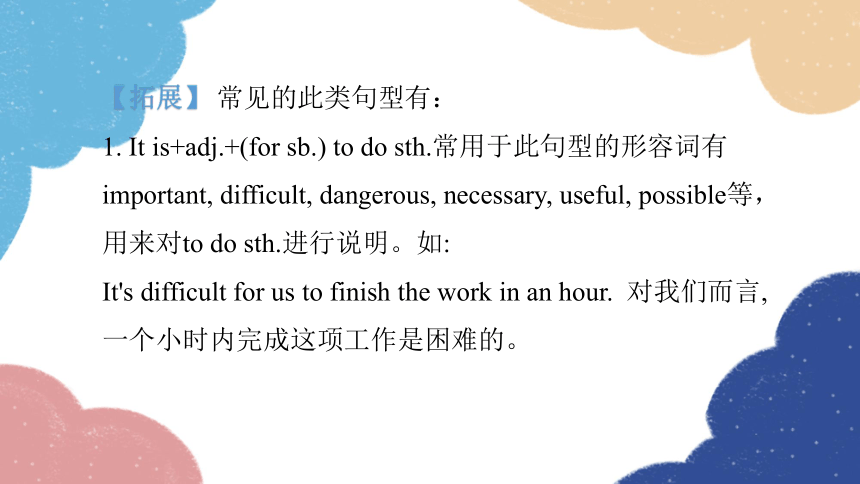
文档简介
(共50张PPT)
Unit 3 Could you please tell me where
the retrooms are
第四课时 Section B (1a~Self Check)
目录
01
02
名师点拨
课前预习
04
课堂小测
05
课后作业
03
语篇理解
课前预习
1. 迷人的;极有吸引力的 adj. _________________
2. 不昂贵的 adj. ____________________
3.不拥挤的;人少的 adj. ________________
4. 便利的;方便的 adj. _____________________
5.商场;购物中心 n. _________________
6.职员 n. ______________
核心单词
fascinating
inexpensive
uncrowded
convenient
mall
clerk
7. 拐角;角落 n. ___________________
8. 礼貌地;客气地 adv. ______________
9. 要求;请求 n.& v. ___________________
10. 方向;方位 n. ______________
11. 正确的;恰当的 adj. ___________________
12. 有礼貌的;客气的 adj. ______________
corner
politely
request
direction
correct
polite
13.直接的;直率的 adj. ______________
14. 讲 (某种语言) 的人;发言者 n. ______________
15.谁;什么人 pron. ______________
16.不礼貌的;粗鲁的 adj. __________________
17. 住址;地址;通讯处 n. ______________
18. 地下的 adj. 地铁 n. ____________________
19. 课程;学科 n. ______________
direct
speaker
whom
impolite
address
underground
course
20. 告诉某人做某事 _________________________
21. 做某事的好地方 _____________________
22. 请求帮助 _____________________
23.例如 ___________________________
常考短语
tell sb. to do sth.
a good place to do sth.
ask for help
for example / such as
24. 依靠;取决于 __________________________
25.花时间做某事 __________________________
26.引入;导致 ____________________
27. 与……交流 __________________________
28. 停车场;停车区 _______________________
29. 因为(做)某事而感谢…… _______________________
depend on
spend time doing sth.
lead into
communicate with
parking lot
thank … for (doing) sth.
30. 期待(做)某事 __________________________________
31. 醒来;叫醒 ______________________
32. 匆忙地 ______________________
33.按时 ______________________
34. 第一次 ______________________
look forward to (doing) sth.
wake up
in a rush
on time
for the first time
35.你喜欢哪种食物?
______________________ do you like
36.……知道如何有礼貌地请求帮助是很重要的。
… it is ________________________ how to ______________ politely.
典型句子
What kind of food
important to know
ask for help
37. 我想了解一下我儿子的学习情况。
_______________________________ my son's study.
38. 我想谢谢你帮助了我。
I would like to ________________________________.
39. 我期待着你的回复。
__________________________________ your reply.
I'd like to know about
thank you for helping me
I'm looking forward to
名师点拨
在此句型中,It用作形式主语,真正的主语是后面的动词不定式(to do sth.)。在英语中,如果主语是较长的动词不定式或一个句子,为了保持句子结构的平衡,避免头重脚轻,通常用It作形式主语放在句首,而把真正的主语放在句尾。如:
It's dangerous to walk on the ice. 在冰上走路是危险的。
12
“It's+adj.+to do sth.”句型的用法
【拓展】 常见的此类句型有:
1. It is+adj.+(for sb.) to do sth.常用于此句型的形容词有important, difficult, dangerous, necessary, useful, possible等,用来对to do sth.进行说明。如:
It's difficult for us to finish the work in an hour. 对我们而言,一个小时内完成这项工作是困难的。
2. It is+adj.+of sb.+to do sth.常用于此句型的形容词有good, kind, nice, clever, wise等,用来对sb.的性格、品质等进行说明。如:
It's kind of you to say so. 你能这么说真是太善良了。
翻译句子
1. 对于你来说,坚持运动是很重要的。
_______________________________________________
2. 那个男人救了湖里的男孩,他真勇敢。
_______________________________________________
专 练
It's important for you to keep doing sports.
It's brave of the man to save the boy in the lake.
13
both, neither, either, all与none的区别
比较项 含义及用法 举例
both 意为“两者都……”,常用搭配为“both … and …”,后接谓语动词复数 Both Lily and Lucy are interested in the Chinese culture. 莉莉和露西都对中国文化感兴趣。
neither 意为“两者都不……”,是both的反义词,常用搭配为“neither … nor …”,表示“既不……也不……”,谓语动词单复数的选择根据“就近原则” Neither you nor I was at home yesterday. 我和你昨天都不在家。
比较项 含义及用法 举例
either 意为“两者中的任何一个”,常用搭配为“either … or …”,意为“要么……要么……”,谓语动词单复数的选择根据“就近原则” Either you or he is able to take part in the competition. 不是你就是他可以参加比赛。
all 意为“三者或者三者以上都……” All of us are here today. 今天我们都到齐了。
none 意为“三者或以上都不……” None of the workers is / are afraid of difficulties.
没有一个工人是害怕困难的。
( )1. —Did your father go to see the latest film with you last Saturday night
—No. It rained heavily, so we _______ stayed at home doing some reading.
A. none B. neither C. all D. both
专 练
D
( )2. —_______ Tom _______ Jerry are fond of the TV program Readers.
—I am also deeply touched by its stories!
A. Both; and B. Neither; nor
C. Either; or D. Not only; but also
A
enough作形容词,意为“足够的”,在句子中作定语或表语。enough也可作副词,意为“充分地”,常放在形容词或副词之后。其后常接不定式,意为“足够……做某事”。如:
big enough足够大 tall enough足够高
enough money 足够多的钱 enough time 足够的时间
14
enough的用法
( )1. My brother is only 15. years old, so he is not _______ to drive a car.
A. young enough B. enough young
C. old enough D. enough old
专 练
C
He is not strong enough to move the heavy box. 他不够强壮,移动不了那个沉重的箱子。
( )2. The boy didn't do his homework _______, though we gave him _______.
A. carefully enough; enough time
B. enough carefully; time enough
C. carelessly enough; enough patience
D. enough carelessly; patience enough
A
15
include, including与included的区别
比较项 含义及用法 举例
include 作及物动词,意为“包含;包括” The price includes both the house and the furniture inside. 这个价格包括房子和里面的家具。
including 用作介词,意为“包括; 包含在内”,后接名词、代词或动词-ing形式,用于列举事物前 Six people, including a baby, were injured in the accident. 事故中有6.人受伤,其中包括一名婴儿。
比较项 含义及用法 举例
included 用作形容词,意为“包括在内的”,通常置于名词之后,用于列举事物后 There are 100 people in this school, 20 teachers included. 这所学校有100个人,其中包括20名老师。
续表
用include, including或included填空
1. Many students in my class, myself ______________, like running.
2. My hobbies ______________ reading and drawing.
3.I've got three days' holiday _________________ New Year's Day.
专 练
included
include
including
16
spend, pay, take与cost的区别
比较项 主语 搭配 举例
spend 人 spend money / time on sth. 在某事 / 某物上花费金钱 / 时间 Timmy spends two hours on his homework every day. 蒂米每天花两小时做作业。
spend money / time (in) doing sth. 花费金钱 / 时间做某事 I spend too much time (in) watching TV. 我花费太多时间看电视。
比较项 主语 搭配 举例
pay 人 pay … to sb. / pay sb. … 付……给某人 Have you paid him the rent yet 你向他付房租了没有?
pay (sb. ) for sth. 为某物付钱(给某人) He paid 20 dollars for this novel. 他花了20美元买这本小说。
take it (形式主 语) / 物 It takes sb. time to do sth. 做某事花费某人时间 It takes him two hours to finish his homework every day. 他每天花两小时做作业。
cost 物 sth. cost(s) sb. money 某物花费某人金钱 This novel cost him 20 dollars. 这本小说花了他20美元。
续表
( )1. My dad _______ the whole afternoon cleaning his car last Sunday.
A. cost B. paid
C. took D. spent
专 练
D
( )2. The beautiful postcard _______ her 5. dollars. That is to say, she _______ 5. dollars for the postcard.
A. cost; paid B. took; spent
C. spent; paid D. cost; spent
A
( )3.—It's reported that Chinese people _______ more than 5.0 minutes a day on WeChat.
—That's true. But I think WeChat is _______ too much of our time.
A. cost; spending B. spend; taking
C. take; paying D. pay; costing
B
一、阅读教材P22-2b的课文,选出下列各题的最佳选项
( )1. The expressions you use might depend on ______________.
A.what you like
B.whom you are speaking to
C.how well you know each other
D.both B and C
语篇理解
D
( )2. Which is NOT the right way to make more polite requests
A.Spending time leading into a request.
B.Asking shorter questions.
C.Using expressions including “Could you please …?” or “May I ask …?”
D.Asking questions indirectly.
B
( )3.Which of the following is TRUE according to the passage
A.You shouldn't ask direct questions in any situations.
B.It might sound polite if you say to your teacher, “When is the school trip?”
C.Longer questions are usually more polite when you ask for help.
D.It might seem more difficult to speak directly than politely.
C
( )4. What's the best title of this passage
A. How to Learn English Well
B. Direct Questions Sound Less Polite
C. How to Use Proper Language to Ask for Help
D. Polite Questions Are Longer
C
二、再仔细阅读课文,回答下列问题
1. What is important when we visit a foreign country
______________________________________________________________________________________________________
It is important to know how to ask for help politely. / To know how to ask for help politely.
2. Why is it all right to ask our classmates direct questions
___________________________________________________3.What do we even need to spend time doing sometimes
______________________________________________________________________________________________________
Because we know them well.
We even need to spend time leading into a request sometimes.
三、本课时主要短语串联应用(用方框内所给短语的适当形式填空)
sound impolite, communicate … with, for example, depend on,
ask for help, a good place to, make a request
It was Jiang Hong's first time to go to America. When he got there, it was time for lunch. Hong asked a man who passed by, “Is there a restaurant near here ” “Sorry, I don't know,” the man answered and walked away. Hong didn't know why. Later, Hong's friend told him that he should ask questions more politely when he was 1._________________. 2.____________, he could say, “Excuse me, could you please tell me where I
asking for help
For example
can find 3.______________________ eat near here ” Hong's friend also told him that the two sentences were correct, but the first one 4.___________________________ because it is too direct for a visitor to ask the native people such a question.
When he came back to the hotel, he searched more information on how to 5.________________ more politely on the Internet. He learned that in order to 6.__________________ better ______________ others, one may make requests
a good place to
sounded impolite
make a request
communicate
with
differently according to different situations. The expressions he uses mostly 7.___________________ the situation and relationship between him and others. Now he knows how to behave well in America.
depend on
一、用所给单词的适当形式填空
1. Mike loves English and he is a good English ______________ (speak).
2. Some people think it's ______________ (polite) to ask a girl's age directly in China.
课堂小测
speaker
impolite
3.Boys and girls, please fill in your names and __________________ (address) in the space provided.
4. We need to learn how to make ______________ (request) politely.
5.Tom walked in one ______________ (direct) and Harry walked in another.
addresses
requests
direction
二、根据汉语意思完成句子,词数不限
6.她不知道如何使用那台食物搅拌器。
She doesn't ___________________________ the blender.
7. 我们不应该总是依靠父母。
We shouldn't always _________________________ our parents.
8. 我期盼着你的到来。
I am ________________________________ your coming.
know how to use
depend on
looking forward to
9. 我们应该用礼貌的语言去寻求帮助。
We should use polite language to __________________.
10. 我爸爸把他的车停在了一个地下停车场。
My dad parked his car in ___________________________.
ask for help
an underground parking lot
三、单项填空
( )11. He _______ less time on stories and film stars than before.
A. takes B. spends C. costs D. pays
( )12. Good grades _______ how hard you study.
A. depend on B. work on C. carry on D. keep on
B
A
( )13.—Would you like _______ a movie with us tonight
—Sorry,I have to help my mother do some chores.
A. see B. seeing
C. to see D. saw
C
( )14. —Would you mind not _______ noises The baby is sleeping.
—Sorry,I didn't know. I _______ she was awake.
A. make; think B. making; thought
C. making; think D. make; thought
B
( )15.—What a good _______ you've given me!Thanks a lot. —You're welcome.
A. information B. news
C. suggestion D. advice
C
课后作业
此部分习题详见独立装订的《课后作业》。请同学们完成《课后作业》Unit 3第四课时的练习题。
THANKS!
Unit 3 Could you please tell me where
the retrooms are
第四课时 Section B (1a~Self Check)
目录
01
02
名师点拨
课前预习
04
课堂小测
05
课后作业
03
语篇理解
课前预习
1. 迷人的;极有吸引力的 adj. _________________
2. 不昂贵的 adj. ____________________
3.不拥挤的;人少的 adj. ________________
4. 便利的;方便的 adj. _____________________
5.商场;购物中心 n. _________________
6.职员 n. ______________
核心单词
fascinating
inexpensive
uncrowded
convenient
mall
clerk
7. 拐角;角落 n. ___________________
8. 礼貌地;客气地 adv. ______________
9. 要求;请求 n.& v. ___________________
10. 方向;方位 n. ______________
11. 正确的;恰当的 adj. ___________________
12. 有礼貌的;客气的 adj. ______________
corner
politely
request
direction
correct
polite
13.直接的;直率的 adj. ______________
14. 讲 (某种语言) 的人;发言者 n. ______________
15.谁;什么人 pron. ______________
16.不礼貌的;粗鲁的 adj. __________________
17. 住址;地址;通讯处 n. ______________
18. 地下的 adj. 地铁 n. ____________________
19. 课程;学科 n. ______________
direct
speaker
whom
impolite
address
underground
course
20. 告诉某人做某事 _________________________
21. 做某事的好地方 _____________________
22. 请求帮助 _____________________
23.例如 ___________________________
常考短语
tell sb. to do sth.
a good place to do sth.
ask for help
for example / such as
24. 依靠;取决于 __________________________
25.花时间做某事 __________________________
26.引入;导致 ____________________
27. 与……交流 __________________________
28. 停车场;停车区 _______________________
29. 因为(做)某事而感谢…… _______________________
depend on
spend time doing sth.
lead into
communicate with
parking lot
thank … for (doing) sth.
30. 期待(做)某事 __________________________________
31. 醒来;叫醒 ______________________
32. 匆忙地 ______________________
33.按时 ______________________
34. 第一次 ______________________
look forward to (doing) sth.
wake up
in a rush
on time
for the first time
35.你喜欢哪种食物?
______________________ do you like
36.……知道如何有礼貌地请求帮助是很重要的。
… it is ________________________ how to ______________ politely.
典型句子
What kind of food
important to know
ask for help
37. 我想了解一下我儿子的学习情况。
_______________________________ my son's study.
38. 我想谢谢你帮助了我。
I would like to ________________________________.
39. 我期待着你的回复。
__________________________________ your reply.
I'd like to know about
thank you for helping me
I'm looking forward to
名师点拨
在此句型中,It用作形式主语,真正的主语是后面的动词不定式(to do sth.)。在英语中,如果主语是较长的动词不定式或一个句子,为了保持句子结构的平衡,避免头重脚轻,通常用It作形式主语放在句首,而把真正的主语放在句尾。如:
It's dangerous to walk on the ice. 在冰上走路是危险的。
12
“It's+adj.+to do sth.”句型的用法
【拓展】 常见的此类句型有:
1. It is+adj.+(for sb.) to do sth.常用于此句型的形容词有important, difficult, dangerous, necessary, useful, possible等,用来对to do sth.进行说明。如:
It's difficult for us to finish the work in an hour. 对我们而言,一个小时内完成这项工作是困难的。
2. It is+adj.+of sb.+to do sth.常用于此句型的形容词有good, kind, nice, clever, wise等,用来对sb.的性格、品质等进行说明。如:
It's kind of you to say so. 你能这么说真是太善良了。
翻译句子
1. 对于你来说,坚持运动是很重要的。
_______________________________________________
2. 那个男人救了湖里的男孩,他真勇敢。
_______________________________________________
专 练
It's important for you to keep doing sports.
It's brave of the man to save the boy in the lake.
13
both, neither, either, all与none的区别
比较项 含义及用法 举例
both 意为“两者都……”,常用搭配为“both … and …”,后接谓语动词复数 Both Lily and Lucy are interested in the Chinese culture. 莉莉和露西都对中国文化感兴趣。
neither 意为“两者都不……”,是both的反义词,常用搭配为“neither … nor …”,表示“既不……也不……”,谓语动词单复数的选择根据“就近原则” Neither you nor I was at home yesterday. 我和你昨天都不在家。
比较项 含义及用法 举例
either 意为“两者中的任何一个”,常用搭配为“either … or …”,意为“要么……要么……”,谓语动词单复数的选择根据“就近原则” Either you or he is able to take part in the competition. 不是你就是他可以参加比赛。
all 意为“三者或者三者以上都……” All of us are here today. 今天我们都到齐了。
none 意为“三者或以上都不……” None of the workers is / are afraid of difficulties.
没有一个工人是害怕困难的。
( )1. —Did your father go to see the latest film with you last Saturday night
—No. It rained heavily, so we _______ stayed at home doing some reading.
A. none B. neither C. all D. both
专 练
D
( )2. —_______ Tom _______ Jerry are fond of the TV program Readers.
—I am also deeply touched by its stories!
A. Both; and B. Neither; nor
C. Either; or D. Not only; but also
A
enough作形容词,意为“足够的”,在句子中作定语或表语。enough也可作副词,意为“充分地”,常放在形容词或副词之后。其后常接不定式,意为“足够……做某事”。如:
big enough足够大 tall enough足够高
enough money 足够多的钱 enough time 足够的时间
14
enough的用法
( )1. My brother is only 15. years old, so he is not _______ to drive a car.
A. young enough B. enough young
C. old enough D. enough old
专 练
C
He is not strong enough to move the heavy box. 他不够强壮,移动不了那个沉重的箱子。
( )2. The boy didn't do his homework _______, though we gave him _______.
A. carefully enough; enough time
B. enough carefully; time enough
C. carelessly enough; enough patience
D. enough carelessly; patience enough
A
15
include, including与included的区别
比较项 含义及用法 举例
include 作及物动词,意为“包含;包括” The price includes both the house and the furniture inside. 这个价格包括房子和里面的家具。
including 用作介词,意为“包括; 包含在内”,后接名词、代词或动词-ing形式,用于列举事物前 Six people, including a baby, were injured in the accident. 事故中有6.人受伤,其中包括一名婴儿。
比较项 含义及用法 举例
included 用作形容词,意为“包括在内的”,通常置于名词之后,用于列举事物后 There are 100 people in this school, 20 teachers included. 这所学校有100个人,其中包括20名老师。
续表
用include, including或included填空
1. Many students in my class, myself ______________, like running.
2. My hobbies ______________ reading and drawing.
3.I've got three days' holiday _________________ New Year's Day.
专 练
included
include
including
16
spend, pay, take与cost的区别
比较项 主语 搭配 举例
spend 人 spend money / time on sth. 在某事 / 某物上花费金钱 / 时间 Timmy spends two hours on his homework every day. 蒂米每天花两小时做作业。
spend money / time (in) doing sth. 花费金钱 / 时间做某事 I spend too much time (in) watching TV. 我花费太多时间看电视。
比较项 主语 搭配 举例
pay 人 pay … to sb. / pay sb. … 付……给某人 Have you paid him the rent yet 你向他付房租了没有?
pay (sb. ) for sth. 为某物付钱(给某人) He paid 20 dollars for this novel. 他花了20美元买这本小说。
take it (形式主 语) / 物 It takes sb. time to do sth. 做某事花费某人时间 It takes him two hours to finish his homework every day. 他每天花两小时做作业。
cost 物 sth. cost(s) sb. money 某物花费某人金钱 This novel cost him 20 dollars. 这本小说花了他20美元。
续表
( )1. My dad _______ the whole afternoon cleaning his car last Sunday.
A. cost B. paid
C. took D. spent
专 练
D
( )2. The beautiful postcard _______ her 5. dollars. That is to say, she _______ 5. dollars for the postcard.
A. cost; paid B. took; spent
C. spent; paid D. cost; spent
A
( )3.—It's reported that Chinese people _______ more than 5.0 minutes a day on WeChat.
—That's true. But I think WeChat is _______ too much of our time.
A. cost; spending B. spend; taking
C. take; paying D. pay; costing
B
一、阅读教材P22-2b的课文,选出下列各题的最佳选项
( )1. The expressions you use might depend on ______________.
A.what you like
B.whom you are speaking to
C.how well you know each other
D.both B and C
语篇理解
D
( )2. Which is NOT the right way to make more polite requests
A.Spending time leading into a request.
B.Asking shorter questions.
C.Using expressions including “Could you please …?” or “May I ask …?”
D.Asking questions indirectly.
B
( )3.Which of the following is TRUE according to the passage
A.You shouldn't ask direct questions in any situations.
B.It might sound polite if you say to your teacher, “When is the school trip?”
C.Longer questions are usually more polite when you ask for help.
D.It might seem more difficult to speak directly than politely.
C
( )4. What's the best title of this passage
A. How to Learn English Well
B. Direct Questions Sound Less Polite
C. How to Use Proper Language to Ask for Help
D. Polite Questions Are Longer
C
二、再仔细阅读课文,回答下列问题
1. What is important when we visit a foreign country
______________________________________________________________________________________________________
It is important to know how to ask for help politely. / To know how to ask for help politely.
2. Why is it all right to ask our classmates direct questions
___________________________________________________3.What do we even need to spend time doing sometimes
______________________________________________________________________________________________________
Because we know them well.
We even need to spend time leading into a request sometimes.
三、本课时主要短语串联应用(用方框内所给短语的适当形式填空)
sound impolite, communicate … with, for example, depend on,
ask for help, a good place to, make a request
It was Jiang Hong's first time to go to America. When he got there, it was time for lunch. Hong asked a man who passed by, “Is there a restaurant near here ” “Sorry, I don't know,” the man answered and walked away. Hong didn't know why. Later, Hong's friend told him that he should ask questions more politely when he was 1._________________. 2.____________, he could say, “Excuse me, could you please tell me where I
asking for help
For example
can find 3.______________________ eat near here ” Hong's friend also told him that the two sentences were correct, but the first one 4.___________________________ because it is too direct for a visitor to ask the native people such a question.
When he came back to the hotel, he searched more information on how to 5.________________ more politely on the Internet. He learned that in order to 6.__________________ better ______________ others, one may make requests
a good place to
sounded impolite
make a request
communicate
with
differently according to different situations. The expressions he uses mostly 7.___________________ the situation and relationship between him and others. Now he knows how to behave well in America.
depend on
一、用所给单词的适当形式填空
1. Mike loves English and he is a good English ______________ (speak).
2. Some people think it's ______________ (polite) to ask a girl's age directly in China.
课堂小测
speaker
impolite
3.Boys and girls, please fill in your names and __________________ (address) in the space provided.
4. We need to learn how to make ______________ (request) politely.
5.Tom walked in one ______________ (direct) and Harry walked in another.
addresses
requests
direction
二、根据汉语意思完成句子,词数不限
6.她不知道如何使用那台食物搅拌器。
She doesn't ___________________________ the blender.
7. 我们不应该总是依靠父母。
We shouldn't always _________________________ our parents.
8. 我期盼着你的到来。
I am ________________________________ your coming.
know how to use
depend on
looking forward to
9. 我们应该用礼貌的语言去寻求帮助。
We should use polite language to __________________.
10. 我爸爸把他的车停在了一个地下停车场。
My dad parked his car in ___________________________.
ask for help
an underground parking lot
三、单项填空
( )11. He _______ less time on stories and film stars than before.
A. takes B. spends C. costs D. pays
( )12. Good grades _______ how hard you study.
A. depend on B. work on C. carry on D. keep on
B
A
( )13.—Would you like _______ a movie with us tonight
—Sorry,I have to help my mother do some chores.
A. see B. seeing
C. to see D. saw
C
( )14. —Would you mind not _______ noises The baby is sleeping.
—Sorry,I didn't know. I _______ she was awake.
A. make; think B. making; thought
C. making; think D. make; thought
B
( )15.—What a good _______ you've given me!Thanks a lot. —You're welcome.
A. information B. news
C. suggestion D. advice
C
课后作业
此部分习题详见独立装订的《课后作业》。请同学们完成《课后作业》Unit 3第四课时的练习题。
THANKS!
同课章节目录
- Unit 1 How can we become good learners.
- Section A
- Section B
- Unit 2 I think that mooncakes are delicious!
- Section A
- Section B
- Unit 3 Could you please tell me where the restroom
- Section A
- Section B
- Unit 4 I used to be afraid of the dark.
- Section A
- Section B
- Unit 5 What are the shirts made of?
- Section A
- Section B
- Review of Units 1-5
- Unit 6 When was it invented?
- Section A
- Section B
- Unit 7 Teenagers should be allowed to choose their
- Section A
- Section B
- Unit 8 It must belong to Carla.
- Section A
- Section B
- Unit 9 I like music that I can dance to.
- Section A
- Section B
- Unit 10 You're supposed to shake hands.
- Section A
- Section B
- Review of Units 6-10
- Unit 11 Sad movies make me cry.
- Section A
- Section B
- Unit 12 Life is full of the unexpected
- Section A
- Section B
- Unit 13 We're trying to save the earth!
- Section A
- Section B
- Unit 14 I remember meeting all of you in Grade 7.
- Section A
- Section B
- Review of Units 11-14
